FAYETTEVILLE, N.C.—Growing up the son of blue-collar workers in a small town in the Ozarks, Jeremy Ricketts, 45, didn’t seem destined for college. His Arkansas high school was hardly known for its academic rigor—foreign language courses were considered a luxury—and the small percentage of students who did go on to college were the children of local professionals. Students like Ricketts were tracked early on into vocational fields.
Following the presumed path after graduation, Ricketts went to work for the furniture manufacturer that employed his father.
His father, a high school graduate who never attended college, had a talent for building, engineering, and fixing things. Ricketts had inherited many of the same skills and had them in mind a couple of years later when he decided to join the Army.
Adventures awaited, demand for soldiers was high, and the pay and benefits were good. Ricketts took quickly to military life—so much so that he served for the next 20 years, retiring in 2020. He left with full disability benefits because of injuries suffered in five tours of duty that included deployments to Kosovo, Iraq, and Kuwait.
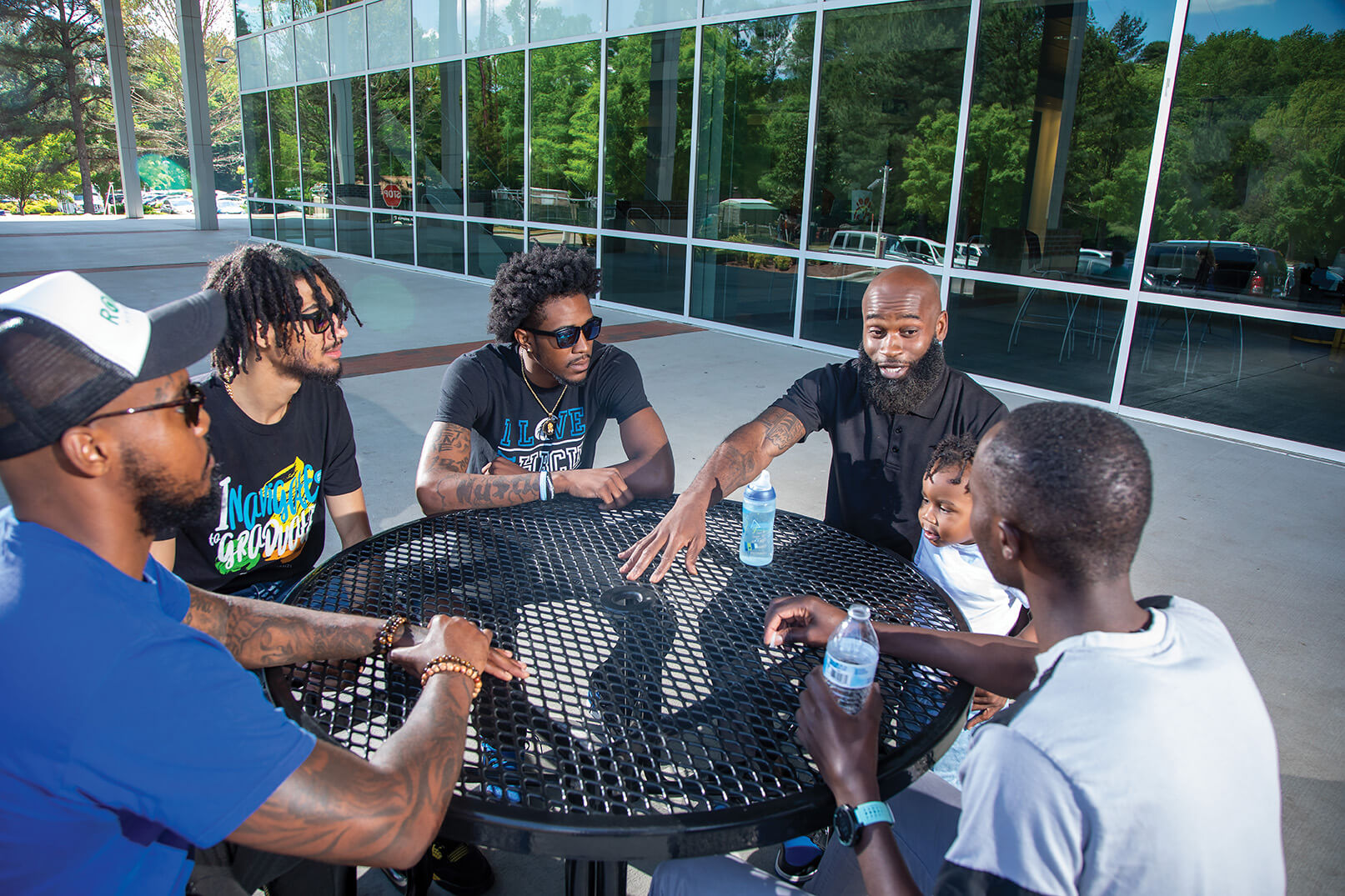
Stateside, Ricketts took a few classes at Western Michigan University where his wife, an Army nurse, was studying. But as a veteran, a conservative, and an older student, he felt out of place. So he welcomed his wife’s transfer to Fort Liberty (formerly Fort Bragg) in North Carolina, and was encouraged to learn that the huge Army base had a longstanding relationship with Fayetteville State University. A federally designated Historically Black College and University (HBCU), Fayetteville State is known for providing affordable higher education to an exceptionally diverse population of students.
It is here, despite being white and two decades older than most of his classmates, that Ricketts says he has found his true community.
“It’s a university that allows people from all different ethnic backgrounds and different experiences to just speak up, where nobody belittles each other for their beliefs,” he said. “It’s like, ‘Hey, you like Democrats, I like Republicans. Cool; let’s go get something to eat.’”
With 6,847 students (5,845 undergraduate), Fayetteville State is playing a key role in the University of North Carolina System’s effort to improve educational attainment among low-income, rural, and military students. As a member of the Frontier Set, an effort funded by the Bill & Melinda Gates Foundation, it joins a group of some 30 institutions across the country that are working to transform how they operate: realigning their cultures, structures, and business models to improve outcomes for all students.
At Fayetteville, that has meant enhancing the university’s already robust online offerings, intensifying and expanding student advising, and finding ways to award students credit for work-based and other non-academic experiences.
Most significantly, the university is making a concerted effort to recruit students older than 25, who now account for nearly half of its undergraduates. It is one of five North Carolina universities participating in the HBCU Adult Learner Initiative, a Lumina Foundation-funded effort designed to help these schools better serve their older students.
Fayetteville State also gets high marks for return on investment—a top-of-mind issue for today’s college students. Though students at HBCUs typically work nearly 12 years after graduation to recoup their college investment, Fayetteville State students take just 2.6 years to realize the return, according to an independent study commissioned by the school.
That’s partly because the university is exceptionally affordable.
A massive military discount
Until last year, in-state tuition here was $2,262, compared with the national average of $11,560. But it just got even better: As part of its NC Promise program, the State of North Carolina recently provided the funds for Fayetteville State to drop its in-state tuition to $1,000 a year. And for active-duty military members, veterans, and their spouses or dependents, the price is often even sweeter: As of 2023, tuition for eligible students is free.
No surprise, then, that military-connected students now make up more than 30 percent of the student body.
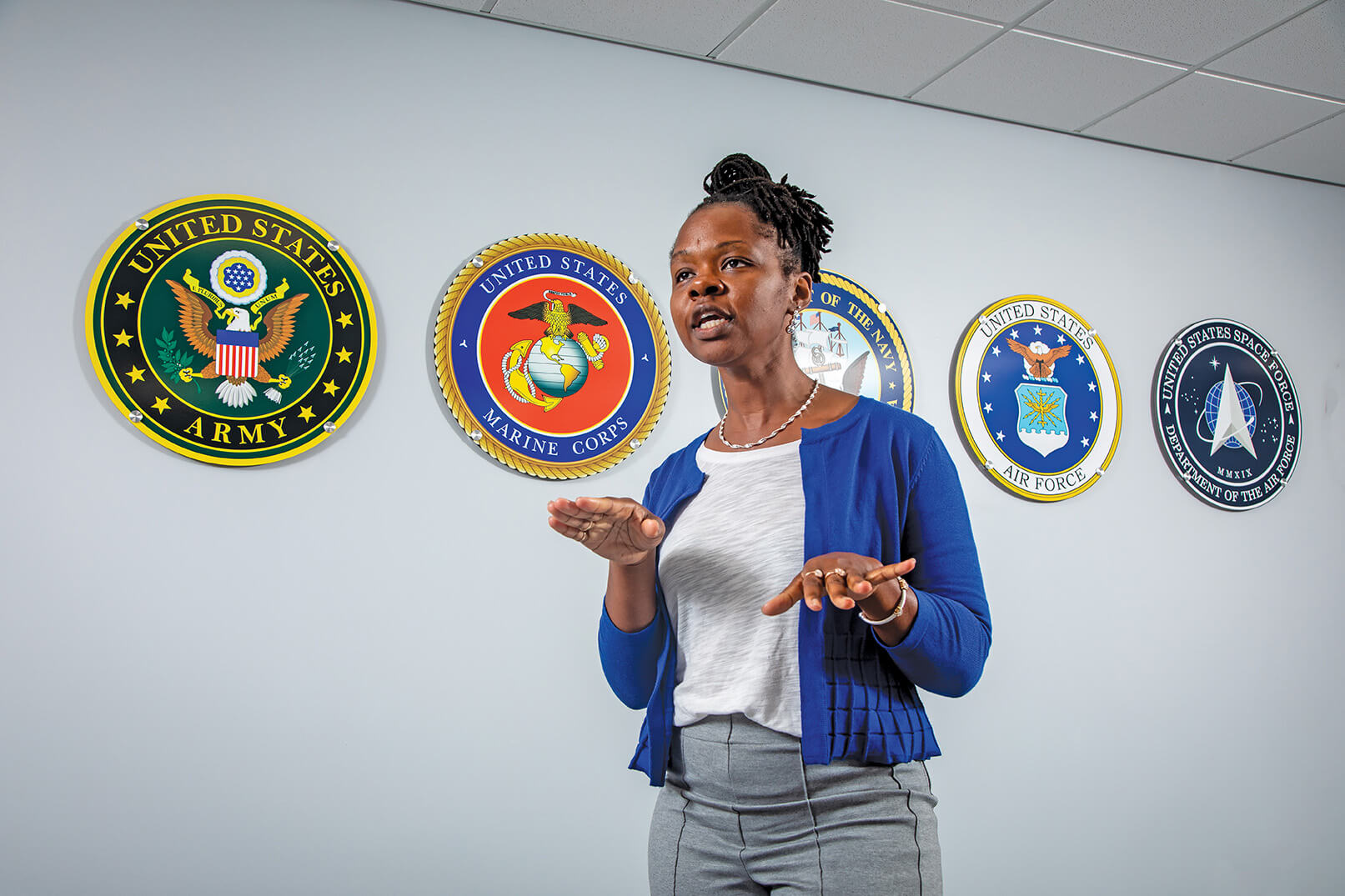
Fayetteville State welcomes veterans not just with military scholarships (housing, meals, and other costs are extra), but with several university departments dedicated to their success. These departments offer one-on-one advising, tailored career counseling, and a comfortable physical space for military-affiliated students to connect with advisors and each other. The university subscribes to the U.S. Veterans Administration’s Principles of Excellence, which require colleges to adopt best practices for supporting military veterans.
Along with its popular and well-regarded business major and graduate business school, the university offers a range of professional certification programs. These programs —which provide students with new skills that build on those developed in the armed forces—lead to well-paying jobs.
Statistically, military-connected students are strong performers, earning higher average GPAs than other students despite facing more obstacles to completion. They are more apt to be first-generation students—and more likely to have disabilities, families, and jobs. Yet studies show that military-connected students are also more likely than other populations to complete their degrees and to pursue occupations in high-demand fields such as health care, business, and STEM.
Disciplined about their studies, students who serve or have served in the armed forces also bring a wealth of experience and diverse perspectives to the classroom. “They bring a lot of life experiences, trial and error,” said Cierra Griffin, Fayetteville State’s executive director for adult learners, transfer, and military students. “They are very focused, very eager to use that higher education in careers they already have—or to switch gears to a career they’ve always dreamed of.”
Ricketts came to Fayetteville State thinking he’d pursue a career that played off the technical and security skills he had developed in the Army. But based on the results of a Fayetteville State skills assessment, his credits from Western Michigan, and suggestions from his advisor, he now plans to change his focus to psychology. “I had never thought about it,” he said. “I did a lot of occupational therapy when I was doing rehab programs for TBI (traumatic brain injury), but I never considered taking my experience from my military injuries and flipping it around. I was, like: ‘One day I could possibly help soldiers.’”
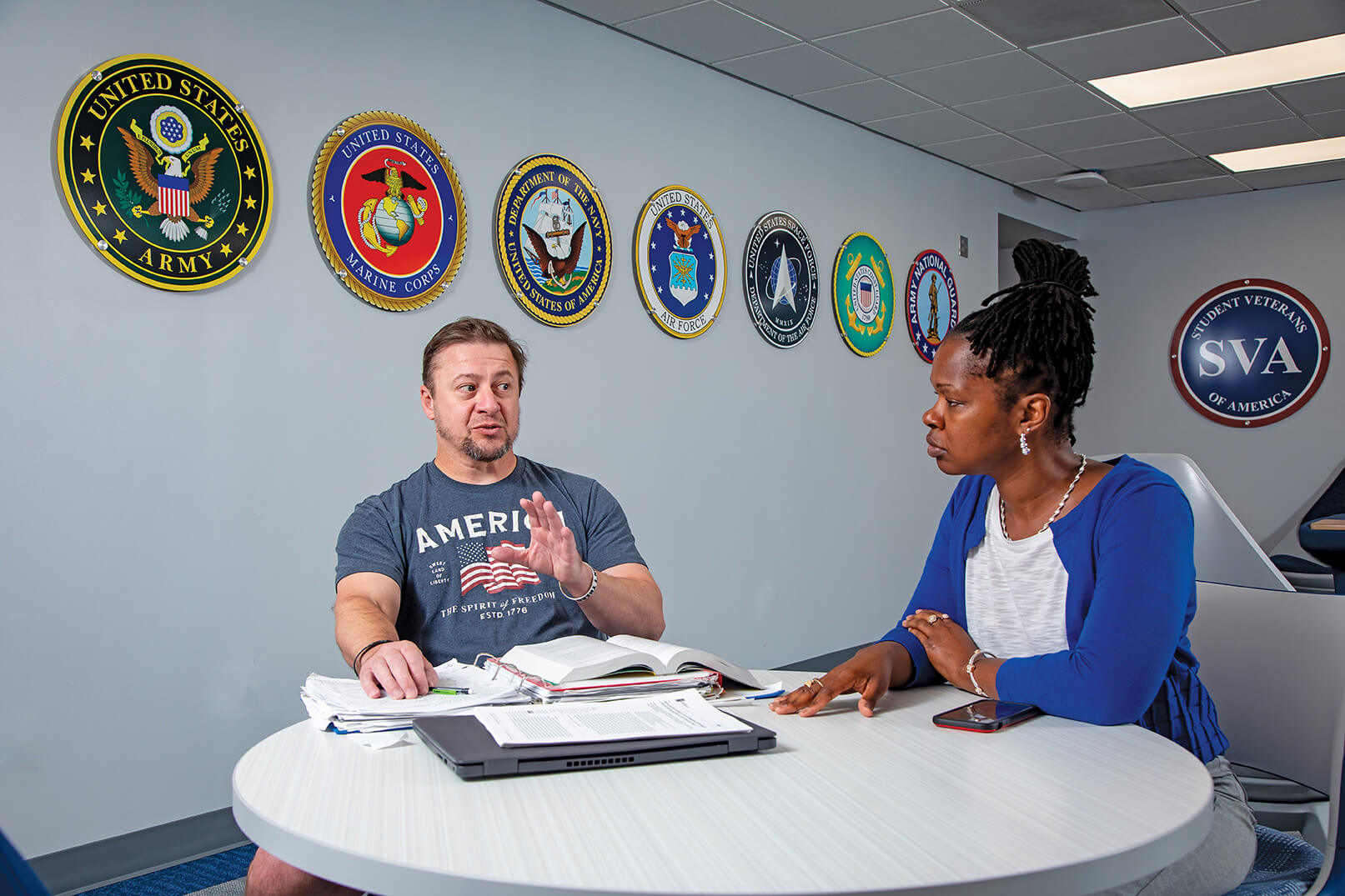
Military-affiliated students like Ricketts can and do have challenges participating fully in campus life, Griffin acknowledged—more so than students who come straight from high school. “While they want to participate as much as the ‘traditional’ college student, their work schedules get in the way. And deployments get in the way, or their spouse’s move gets in the way.” (Ricketts, for his part, has a 12-year-old son to look after.) And despite their age, training, and global outlook, these students often exhibit insecurity about being on a college campus, she said. “They can feel they don’t have much to contribute when in fact they have so much to contribute.”
Griffin, herself an Air Force veteran, leads a team that is there to help, with flexible hours and approaches that meet students on their schedules and their terms. “You have to actively listen, and that means being available after business hours,” she said. She has also established chat groups for adult and military students, where participation is high. “Somebody will ask the question that everybody else was wondering about but didn’t want to ask, and then people just start chiming in and sharing information,” she said. Griffin also is pushing to hold more campus events in a hybrid format so these students can feel more closely connected to campus life.
Remote learning has long been a key strategy to increase opportunities for adult students at Fayetteville State, and it is expanding its offerings and regularly boosting its capacity. Not surprisingly, the number of students enrolled exclusively in online courses has grown steadily. Today, nearly half (46.7 percent) take classes entirely online. Remote learning is not considered a separate program here. All faculty members and new hires must have the capacity to teach effectively online.
The online option has made all the difference for Veronica Chance, who at age 46 finally has the plan for higher education she lacked after graduating from high school. Back then, her options seemed limited: One of six children of a single mother, she knew nothing about financial aid, and no guidance counselor had bothered to fill in the gaps. So upon graduation, her low-wage after-school job became her full-time employment.
When Chance gave birth to a son at age 20, she decided to improve her financial prospects, enrolling at her local community college and eventually earning an associate degree in computer programming. But the hoped-for employment offers didn’t come, so she bounced from job to job. She had another son and (“foolishly,” she says) got married.
By age 30, Chance had developed an addiction to crack cocaine. Earning a decent living and taking care of her boys became more of a struggle until one day she quit her habit cold turkey. “I just got so tired of being in the place that I was in,” she said. “Thank the good Lord I have been delivered from that.” Now working as a medical records clerk in a mental health clinic, she has taken an interest in social work. For that, she needs a college degree.
“I had a conversation with one of the ladies in the office, and she said, ‘Do you know how many people in their 40s, and even 50s, go back to school?’” Chance enrolled at Fayetteville State this year. Most of her community college credits transferred, and—with a Pell Grant and a low-interest loan—she is attending full time and set to graduate in 2026.
What makes the program possible is Chance’s ability to take all but one of her classes virtually. The online option, she says, is the only way she can manage her academic work with her job duties and the responsibilities of caring for her now 17-year-old son, who has special needs. “I feel like if I can overcome (a drug habit), then me being able to go to school, go to work, and take care of my son should be nothing, right?”
It’s not “nothing,” of course. It’s an opportunity made possible not only by Chance’s determination and discipline, but also by the deliberate efforts of a university that has transformed its practices to meet adult students where they are.
And sometimes where they are is a hard place.
A difficult personal path
As routes to higher education go, Casey Gregg’s has been longer and more complicated than most. At age 17, while away from his Maryland home and visiting relatives in South Carolina, he joined an older cousin in attempting to rob a group of presumed drug dealers.
Perhaps predictably, things went terribly wrong. Gregg shot a man and was arrested on charges of assault and battery with intent to kill, criminal conspiracy, and grand larceny. Tried as an adult, he was convicted and served nearly two decades in prison before his release in 2020.
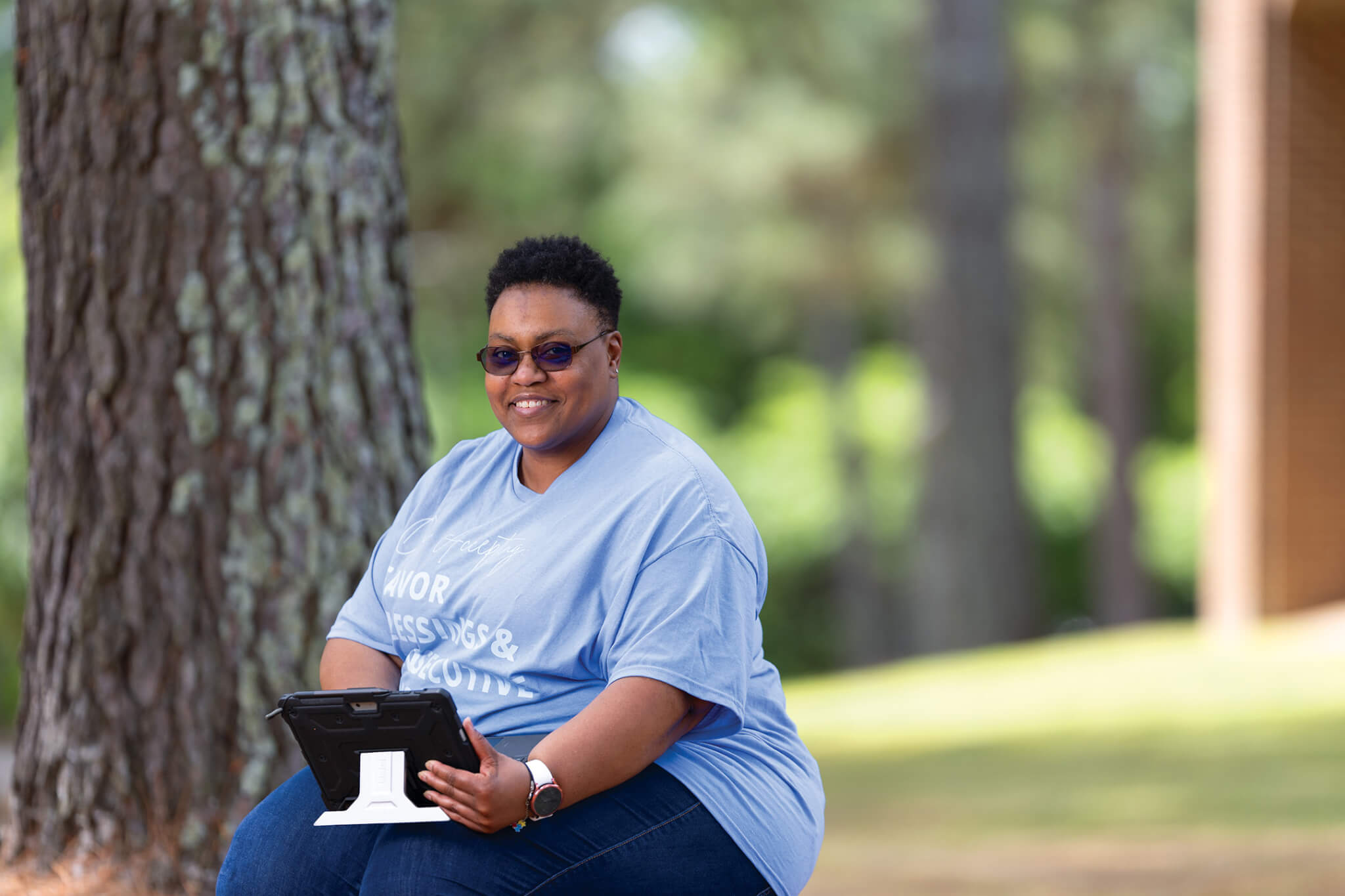
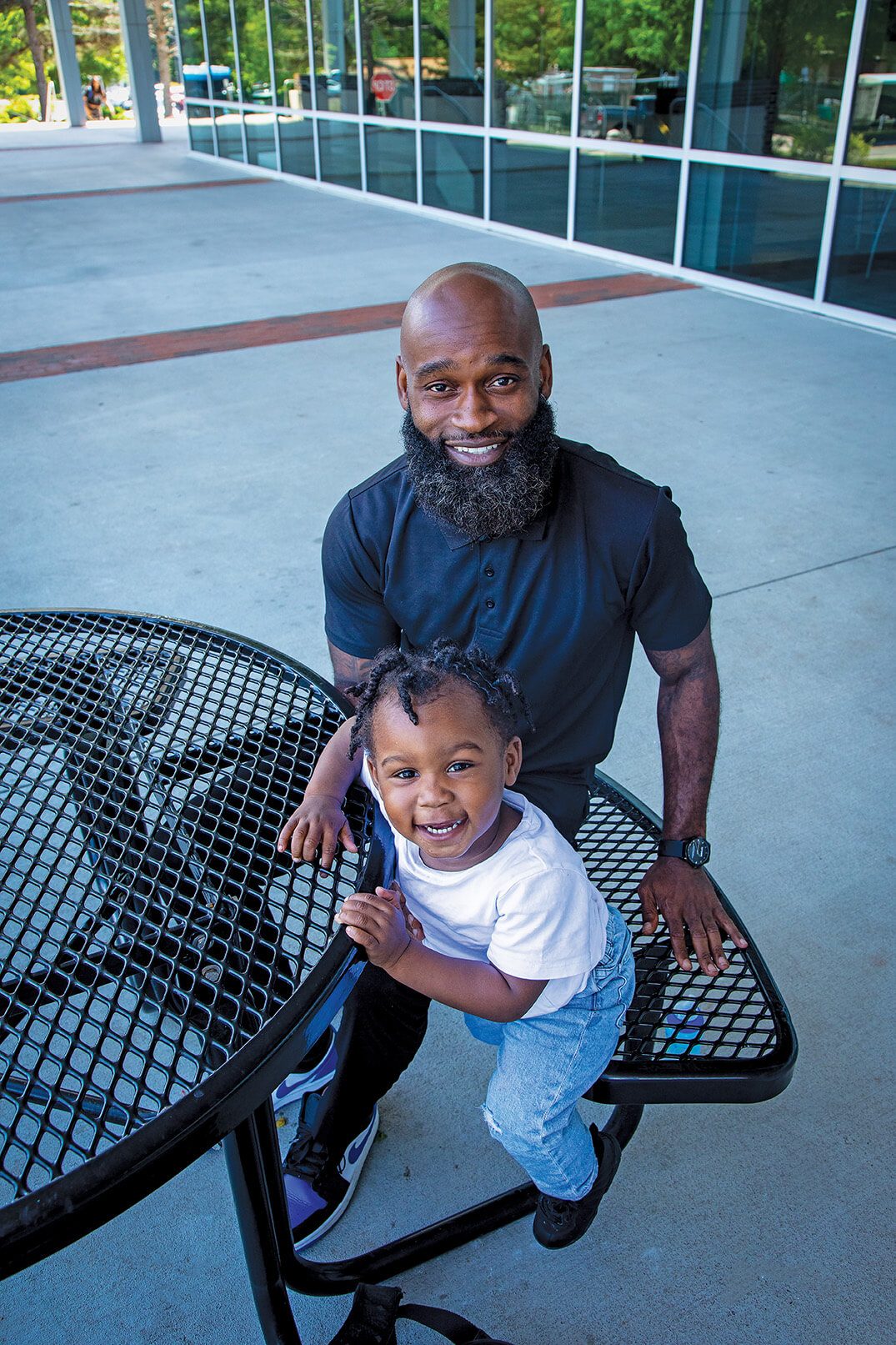
While incarcerated, Gregg, now age 39, earned his GED and read, by his count, hundreds of books—everything from history to economics to world religion. “I have always had a curious mind,” he said. Released to live with his mother in North Carolina, he has worked at factory and janitorial jobs and volunteered as a mentor to at-risk young people in the hopes of keeping them off the path he took.
It was while giving a talk to some young probationers that Gregg was approached by a dean at Fayetteville State. He hadn’t even considered college, but Gregg listened to the dean’s pitch with growing interest. “I was like, ‘I can’t go,’ and he was, like, ‘Just fill out the application, man.’ And I did. It took five or six months, but I am here.”
Money at first seemed a big barrier. Gregg was doing two years of probation and community service, and his jobs paid little. “The economic situation was definitely not good,” he said. But with the help of financial advisors at Fayetteville State, he received a Pell Grant and other need-based aid that covered his tuition.
A first-year student, Gregg is majoring in interdisciplinary studies while working to establish a mentoring business serving educational institutions and nonprofit organizations. “Most of these (mentees) are 18 to 25, and they come from a poverty background,” he said.
“I provide them with some social-emotional learning, some career readiness, a little bit of professional
development…Most of the other jobs I could get wouldn’t be aligned with my passion and my purpose.
So I took the entrepreneurial route.”
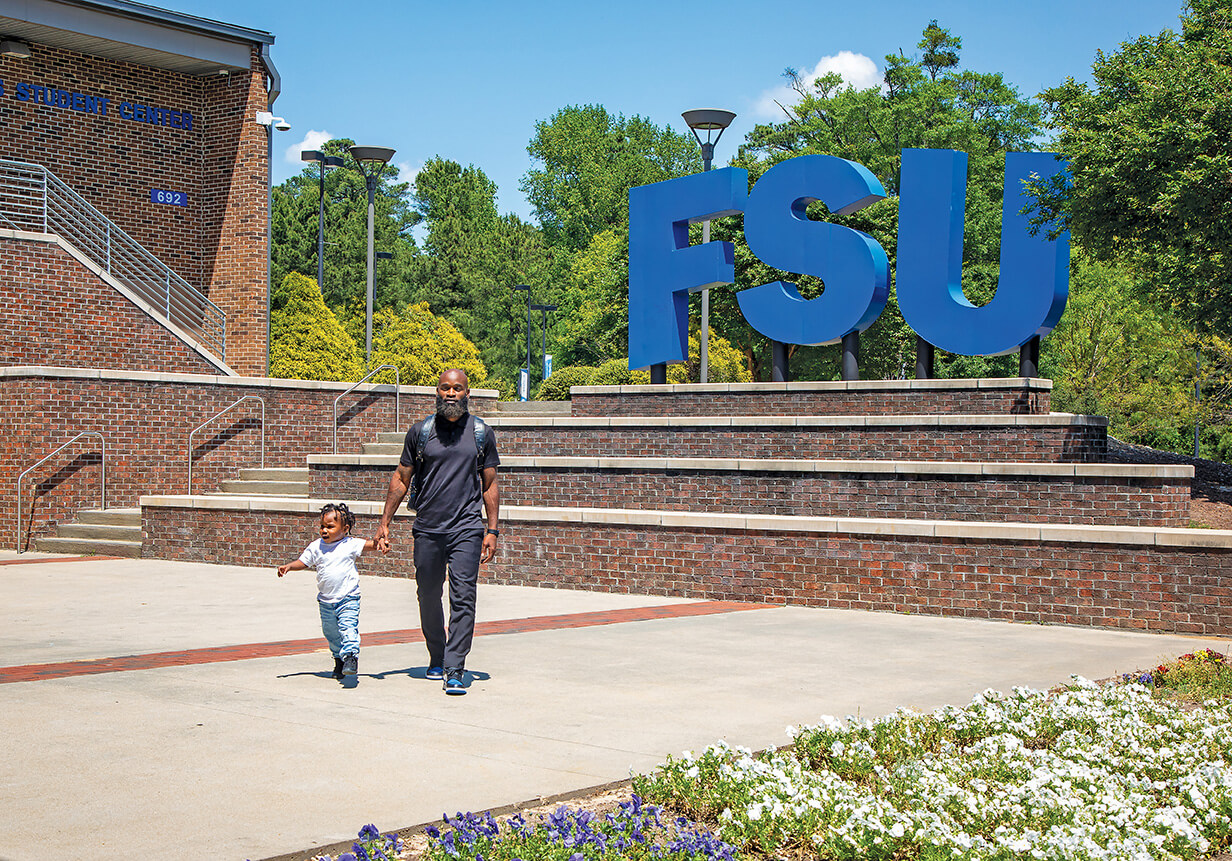
“This place is very comfortable,” Gregg says. “They have put their
arms around me and helped me figure things out.”
Gregg is taking 13 credits this semester, including classes in health care management, political science, criminal justice, and math. To help with his transition from prison to college, he enjoys the support of one-on-one advisors and meets with an academic coach every week. “She gives me everything I need, directs me to the people and resources I need. We plan assignments and make sure I am held accountable for my workload.”
Keeping students accountable and on track is the goal of Fayetteville State’s “30-60-90” initiative. It gives students clear guidelines about how they must progress and makes sure they are hitting milestones—and reducing costs—along the way. Advisors urge students to take 15 credits each semester, making it clear that with 30 hours, they become sophomores, with 60 they become juniors, with 90, seniors, and with 120 they graduate.
Still, officials know that adult students often hit bumps in the road. So along with other supports, the university helps them stay on the path with free summer school. Undergraduates who need to make up credits or who want to accelerate their progress can qualify for two courses or up to seven credit hours in the summer—with book rental fees, housing, and meals provided. Gregg, for one, is taking advantage.
Meanwhile, all students, advisors, and faculty use “Bronco Navigate,” an online tool that makes it easy for advisors to review student records, keep notes, and share information. It also gives students access to financial resources and social services.
This online tool at first presented a learning curve to Gregg, who had extremely limited access to internet technology in prison. “Understanding the tech and learning how to navigate through the laptop—that was a bit much because of my situation,” he admitted. But—just as he has in learning academic writing style, taking math for the first time since high school, and being the old guy on campus—Gregg has adapted.
And he knows he couldn’t have done it alone.
In a way, he speaks for hundreds of his fellow adult students when he says: “This place is very comfortable. They have put their arms around me and helped me figure things out.”
